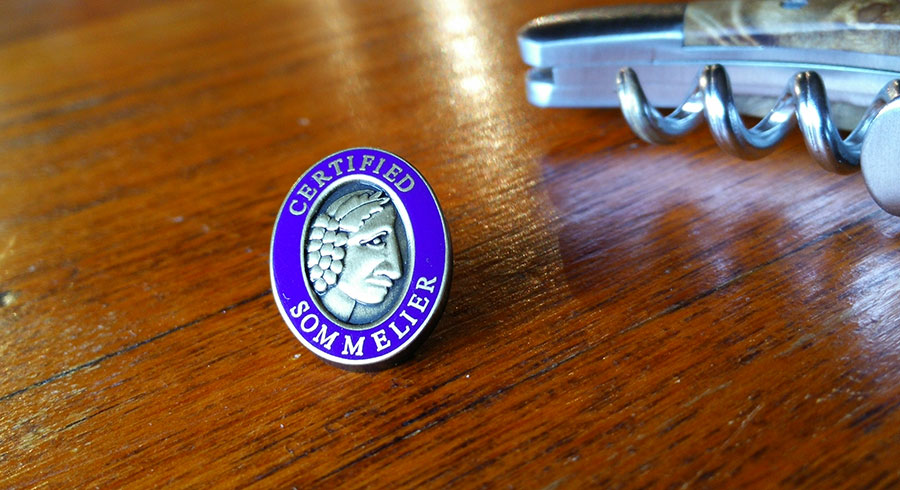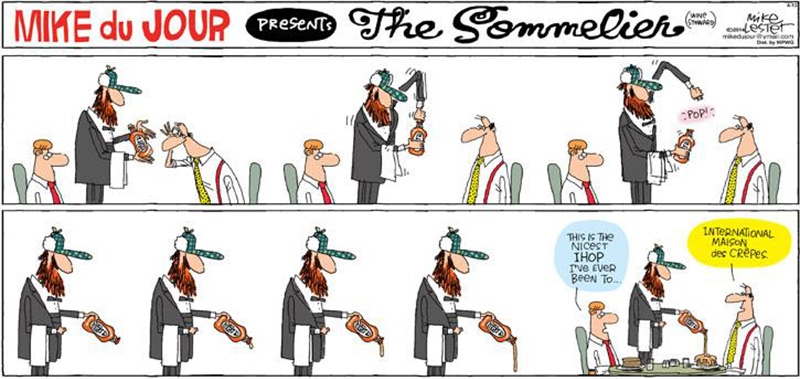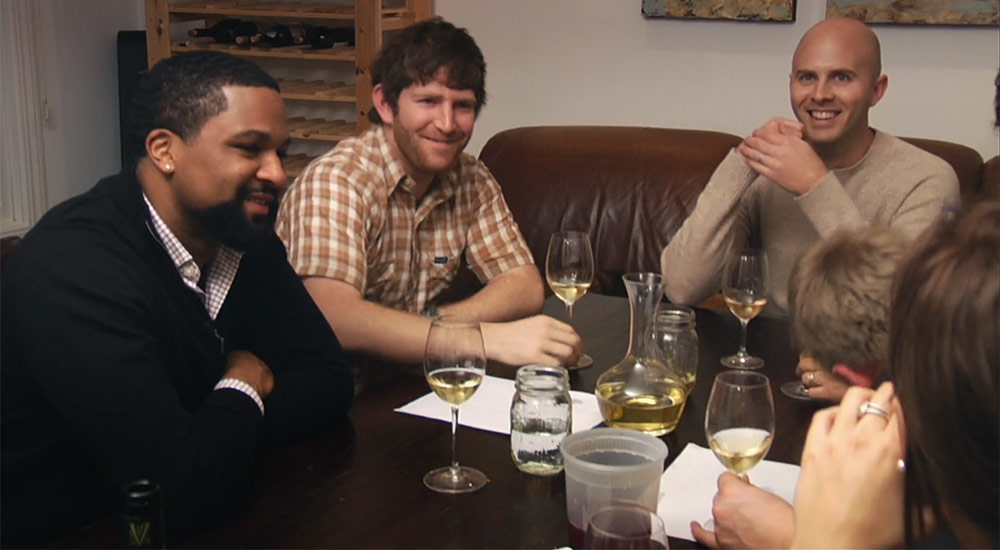The sommelier. What was once just the guy in the room with a corkscrew has become one of the sexier titles to hold these days. But what does it mean? The most basic definition of a sommelier is that it’s essentially a server, usually in a restaurant, who specializes heavily in wines but also beers, spirits, mixed drinks, tea, coffee, and historically, cigars.
This makes it pretty clear as to what the sommelier does but an issue arises when someone states that they’re a sommelier (or the more ridiculous “somm” abbreviation that appears here to stay) but they’re not actually working in service. Is this person still a sommelier? The simple answer is, no.
A perfect example of this confusion was when a winemaking friend of mine invited three professional sommeliers from the US to work in his cellar. On the evening of the final dinner of their stay, another friend of the owner arrived, and these sommeliers asked him what he does for a living to which he stated, “I’m a sommelier.”
Their next logical question was, “Oh cool, where do you work?” to which his reply was, “Oh, um, I, uh don’t work in a restaurant. I just went and did the courses.” They were unimpressed as it now seems that everyone from web developers to lawyers to marketers all want in on being a “sommelier” when in fact, only someone working as one can really state that they are one.
It’s a lot like someone who went to culinary school stating that they’re a chef even if they’ve never worked in a restaurant or someone who went to film school stating that they’re a filmmaker even if they’ve never made a film or someone who studied architecture stating that they’re an architect if they’ve well, you get the idea. And sure, people can argue this point if they’d like in these examples but a sommelier is a vocational profession that requires active involvement to actually “be” one.
This is an important distinction as working this position is a hard job in the hospitality industry where you’re on your feet, running, the entire shift. Hours are long and include late nights, it’s very physical, and so it favors a younger demographic due to this. Also, the pay isn’t usually that amazing.
The salient point to understand here is that for someone, say, working in marketing for a drinks PR firm to run around calling themselves a “sommelier” is nothing but a disservice to the thousands of people who are quite literally busting their asses night in, night out to serve people their drinks of choice.
But I actually…
I largely blame the United States for this tendency as there exists the culture of having a job that pays the bills but presenting yourself as what you’d rather be doing. Someone pushing paper in a dreary government job might call themselves an “artist” to everyone they meet in a social setting. Or the most classic example is someone who calls themselves an “actor” yet is working in a coffeeshop or is fully out of work. There’s really nothing wrong with this as both these examples of the aspiring artist or actor are of people (theoretically) active in striving for their creative pursuits.
However, deeming yourself a “sommelier” to your colleagues at the law firm is just wanting to show off that you know something about wine because you did a course–unless after a 16 hour day at the firm, you’re then going to maintain and serve the list at a restaurant. Sure, this could actually happen, but the rarity of it is exceedingly slim.
“Titulitis”
If you live in Spain like I do or a comparable country which lacks upward job mobility, you’ll be very aware of “titulitis” which is essentially gaining educational certificates and titles for the sake of gaining ever more titles. It is not uncommon to find people who have actually earned two PhDs and might even be working on some other advanced academic title, while paying the bills as a civil servant.
But when it comes to the sommelier, this has become a “prestigious” title that it seems people the world over have been itching to earn, even if they have absolutely no interest in doing the actual work of a sommelier. The fire has been fanned to a great deal by the never-ending series of “SOMM” films as well as skin-deep books like “Cork Dork” that glamorize and fetishize the profession more than actually giving any window into what it really takes to do it.
Given the rise of the “star chef” through multiple TV shows (Top Chef, Iron Chef, Hell’s Kitchen, etc.), it’s no wonder a front-of-the-house equivalent has been elevated beyond its humble beginnings as well, no matter how dull it usually is when filmed (ex. Uncorked). Curiously though, while you may find someone at the previously-mentioned law firm example claiming to be a sommelier, you’ll never hear them say they’re a “chef de cuisine” if they don’t work in hospitality.
There are now many sommelier-certifying bodies around the world, and you can find a number of them listed below. But it needs to be emphasized that for the most part, they’re just that and they’re neither government-sanctioned official educational institutions nor even accredited programs. So that “Master Sommelier” title actually isn’t a “master” in any sense of how the academic world defines it. It’s a group of people with no educational background who started certifying “masters” who have then gone on to certify other “masters”.
These programs offer up an important distinction as the tests are (or at least should be) difficult and if you’ve earned one of them, there isn’t anything wrong in stating it on a resumé, but you should be using the full title of the certificate. For example, I passed the Certified Sommelier exam but I’m actually a journalist. Even though I work the floor doing wine service at a friend’s restaurant from time to time when he’s swamped, by no means would I ever call myself a “sommelier”. In fact, when I’m invited to talks and people ask for my bio, I emphasize the “Certified Sommelier” aspect and if they send it back to me with just “sommelier”, I ask them to remove it altogether as that simplification is disingenuous at best.
As to the why
It’s an important difference to point out as there are a lot of people taking these exams when they most probably shouldn’t be. I took it because I lead a lot of tastings and have a public-facing aspect on top of my writing work. If I was to do it all over again, I would have just gone the way of the WSET or another purely educational body. I fully own up to that bad choice in directions which is why I wrote this article to hopefully save others the trouble.
A friend of mine who leads wine tours and has done the WSET II course and is working on WSET III is often asked by clients if she’s a sommelier to which she replies, “No, of course not, I don’t work in a restaurant.” There is unfortunately a conflagration now with any studies in wine being considered something sommelier-y as shown with well-known wine writer Jancis Robinson who is a Master of Wine being included on “Top Sommelier Lists” to which she’s glibly replied, “Thanks for that but not a sommelier. Never served a bottle of wine in my life.”
 So why is it important to emphasize the difference in “working as a sommelier” versus having “earned a sommelier title” for some reason? It’s for the simple reason that these are different things and claiming to be one infers that you’re doing work you’re not actually doing, all in the name of street cred you most definitely don’t deserve.
So why is it important to emphasize the difference in “working as a sommelier” versus having “earned a sommelier title” for some reason? It’s for the simple reason that these are different things and claiming to be one infers that you’re doing work you’re not actually doing, all in the name of street cred you most definitely don’t deserve.
On a certain level, saying that you’re a “somm” is now used to infer some level of authority, often in a shammy manner. Take for instance the issue of this new enterprise, “Good Clean Wine” that wine people have been busy tweeting about with outrage. In their website one of the founders named, “Michelle” states that she’s a “L1 somm”. I take this to mean that she’s passed the Introductory Level of the Court of Master Sommeliers (although who knows) and as she clearly doesn’t work in a restaurant, she’s stating this to give herself a questionable sheen of authority as a wine expert in order move a rather disingenuous product. [Note that after writing this article the mention was scrubbed from their website, but the original can be viewed to the right.]
Anyone who wants to know more about wine, should most definitely dive into it head on, but until we get over this “I’m a somm!” silliness it feels like a lot of people are going to continue heading down unnecessary educational paths and fill up the seats for people who actually are working in hospitality and have immediate need of these certifications and knowledge for practical reasons.
And let’s keep in mind that the people working in restaurants who, in addition to the tough hours, have seen massive unemployment due to their actual chosen careers and are mostly out of work at the moment. So, if you think claiming to be a sommelier is cool, try going without work and see how cool that actually is.
A selection of recognized sommelier certifying bodies:
- Court of Master Sommeliers – They give tests internationally but has European and American chapter which are the main focal points. Exams are almost always in English.
- International Sommelier Association – Also international with a great many places to take the exams which are listed on their website. Exams are given in English, Spanish, and French.
- Associazione Italiana Sommelier – Obviously, given the name, this is based in Italy and, unsurprisingly, all courses and exams are in Italian but for anyone who speaks it, the association is held in high regard.
- Canadian Association of Professional Sommeliers Certification – As the name states, this is based in Canada.
- Cordon Bleu Paris Sommelier Certification – While Cordon Bleu is everywhere now, this is a certification done specifically at their location in Paris, France.
And please note that the WSET is NOT a sommelier program and will be covered in a future article.
You’re reading a free article on Hudin.com.
Please consider subscribing to support independent journalism and get access to regional wine reports as well as insider information on the wine world.





Everyone’s a curator these days too.
Drawing up a list does not make you a curator.
Depends on how much attitude you present it with ;)
Miguel, great article. As one of thise “civil servants” myself, with a xams earlier this year so many people asked if that made me a Sommelier! I actually responded as you did, stating no, I don’t work in a restaurant etc… But it did make me think how to describe my knowledge, without sounding pretentious, to friends who asked. As I move on in my studies, the thought crosses my mind, how can us passionate mortals, not in the trade, but knowledgeable refer to ourselves? Any thoughts?
There’s not really any good answer to that which is why people like this “sommelier” term. You just have to tell them WSET. Even if someone is a Master of Wine, while it sounds impressive, most people don’t know what it actually is. These are ultimately certifications for within the wine trade which is what’s more important.
In your list of certifying bodies you do not mention the North America Sommelier Association, based in LA. What do you know about this organization?
Honestly, very little. I’ve come across them on the web but there’s some organization that just sorta vanished a few years back and I can’t remember which is was. Whatever the case, it’s not a terribly well-known entity outside of its immediate sphere so I wouldn’t include it anyways.
Very interesting article. I believe it is an issue as well. I list CS on the end of everything I have or Certified Sommelier on my business card, but it is more for credibility stake in what we do. I don’t refer to myself as a sommelier though, as exactly – I don’t do that job.
But, I think it is important to note passing the exam as it was super hard, and does deserve to be talked about. As with everything, though, I believe presenting things in an HONEST light, and if done so then it makes it easier to talk about things with people. The L1 somm thing drives me. fucking. NUTS. As well as presenting yourself in a way that is only to make yourself look better and isn’t honest etc.
Good work!
Thanks for your feedback.
One small note that’s come up and I think is even on the CMS website is that technically only Master Sommeliers can use MS wheres AS, CS, and I suppose IS if someone did that, aren’t kosher.
“Most Master Sommeliers are somms in name only” | The Gray Report wine blog (May 14, 2014)
URL: https://blog.wblakegray.com/2014/05/most-master-sommeliers-are-somms-in.html
“For Wine Expertise, Who Can You Really Trust?” | The Wall Street Journal (Feb 26, 2020)
Subheadline: “As sommeliers have grown more visible in popular culture, the definition of the role has been stretched to the breaking point. Who actually deserves the title?”
URL: https://www.wsj.com/articles/for-wine-expertise-who-can-you-really-trust-11582748957
Having a WSET diploma myself, I agree in principle. Though the wine industry is still forming and we will see a better structure soon. Sommelier as a profession that we knew is dying as far as I am concerned. Though I am only concerned about natural wines so I would be in a minority with this statement :)
There will always be a need for some type of “sommelier” like position but it’s definitely going to change and not just because of the pandemic but due to the fact that the Court of Master Sommeliers has had too many scandals (with more probably to come) and it’s turning a lot of people off.
Very good Miquel. Can’t stand the use of the word Somm. Yes, Americans seem to use it for every wine pourer , no matter their experience, wine knowledge etc.
A good Sommelier should have a Chef-like understanding of food, ingredients, cooking methods, presentation , matching wine to food and many other aspects of communication, stock control, etc.
Something like 10 years ago an individual at a wine tasting introduced themselves to me as “the somm” at a restaurant and then couldn’t figure out how to get a plastic capsule off a bottle of wine.
“If you live in Spain like I do”
Let me stop you right there. This is a cultural thing. In the United States it is definitely acceptable to call yourself a given title if you have passed a difficult test gatekeeping that title. You might try to claim that you find this gauche, but you wrote a whole article about who gets to call themselves a given title, so you can’t appeal to “who cares bro.” You care, and so does everyone else. The culture as a whole feels comfortable calling WSET 3 people “sommeliers” or “somms.” And the United States of America, not Spain or even Europe, gets to set the default for the world as a whole. That’s what you get for being the top dog. Spain is in fact a satelite sate of the US. We dictate to you, not the other way around.
“So that “Master Sommelier” title actually isn’t a “master” in any sense of how the academic world defines it. It’s a group of people with no educational background who started certifying “masters” who have then gone on to certify other “masters”.”
That is quite literally how universities got started. That’s what an academic IS. Or actually, unlike modern universities, the Master Sommelier test was actually difficult. (Or was, before the me too hysteria.)
Thank you for lecturing an American (it’s in every bio I have) on what is “acceptable” in the United States as well as shitting on #metoo. I’m sorry you’ve gone and paid money for a certificate, but, as outlined in the article, you are not a sommelier unless working serving wine, but let’s clarify a few things:
Actual universities have accreditation systems thus, one can get a bachelors at Chico State which is recognized for a Masters program at Texas A&M and then in turn for a PhD at Harvard. Thus both Master Sommeliers and Masters of Wine are not actual “masters” in any sense, should be called out more for co-opting this title, and should ultimately stop using them completely. Neither of these titles is recognized by any other institution.
In fact, the Masters of Wine was so closed off that you couldn’t even receive it unless a British national, even if passing the tests, until the early 1980s. And the Court of Master Sommeliers was created by the Masters of Wine, so, there you go.